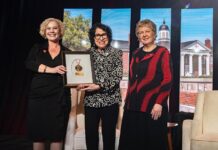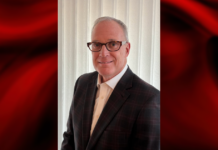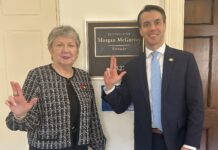
Kentucky Justice Secretary John Tilley, the University of Kentucky and the University of Louisville announced a new partnership today that will strengthen the state Medical Examiner’s Office, a vital step amid the deadly opioid epidemic and a national shortage of forensic doctors.
Under the agreement, the Justice Cabinet will contract with the universities for forensic pathology services, combining resources for both autopsies and medical education. The move is expected to boost salaries for doctors, helping improve recruitment and retention, and it will help the cabinet avoid charging counties a fee for autopsies.
“The opioid crisis has placed tremendous strains on our state, and we must take every opportunity to innovate and find efficiencies,” Secretary Tilley said. “By partnering with universities, we can improve the pay and size of our forensics team while also ensuring that families, coroners and police get the answers they need when tragedy strikes.”
The agreement also will help UK and UofL maximize training opportunities for medical students and residents in pathology.
“Our collaboration with the Justice Cabinet and their Medical Examiner’s Office illustrates the University of Kentucky’s desire to take a comprehensive, ‘all hands on deck’ approach to addressing Kentucky’s opioid crisis,” said Dr. Darrell Jennings, chair of the UK Department of Pathology and Laboratory Medicine. “This opportunity will provide our medical students in Lexington, Bowling Green and Northern Kentucky, along with our residents and fellows, with unparalleled training on the front lines, harnessing the power of compassion and commitment to transform the future.”
“Through this strengthened relationship with the state Medical Examiner’s Office, we will broaden the educational and training opportunities for our students, residents and fellows,” said Dr. Eyas Hattab, chair of the Department of Pathology and Laboratory Sciences at UofL. “Our trainees will have access to the number and variety of cases that are invaluable as they prepare for the next steps in their careers.”
UofL will provide up to six pathologists in state medical examiner offices; UK will provide up to four. The cabinet will pay the universities for any services performed by these doctors on a scale similar to current costs. The cabinet and universities will also collaborate on strategies that could possibly lower the overall cost of the program in the long run.
The Medical Examiner’s Office currently employs nine doctors – six in Louisville, two in Frankfort and one in Madisonville. The partnership is expected to provide a net increase of one forensic pathologist immediately with opportunities to add an additional doctor, possibly within two years, thanks to recruitment assistance from the universities.
All doctors have an opportunity to transition into university positions, and those who do are expected to receive a salary increase depending on the individual contracts between doctors and universities. Added salary will compensate for additional responsibilities such as teaching, researching, writing, consulting or other contributions that doctors are interested in pursuing.
While the exact terms of employment will depend on the individual contracts, the higher pay scale is expected to make Kentucky more effective at hiring and keeping new doctors.
Kentucky, like many other states, has struggled to recruit forensic pathologists in recent years due to a national shortage. Only about 500 forensic doctors are currently practicing across the country. At the same time, overdose deaths have continued to climb over the past decade, driving up demand for autopsies and toxicology tests. More than 1,400 Kentuckians died from an overdose in 2016.
In response, enhancing the Medical Examiners’ Office has remained a high priority under the current administration.
In 2016, the office resumed services in Madisonville (following a two-year hiatus), helping coroners and law enforcement agencies across Western Kentucky reduce travel costs and obtain evidence at a faster pace.
Secretary Tilley said he plans to continue looking for ways to improve the office. For instance, the cabinet is aggressively seeking grant funds to expand capacity, reduce caseloads, expand toxicology analysis and enhance data collection.
“We want to consider every option to enhance services while avoiding fees for counties,” he said. “UK and UofL have been excellent partners in this process, and we look forward to continuing our work with coroners to ensure their needs are met.”


























